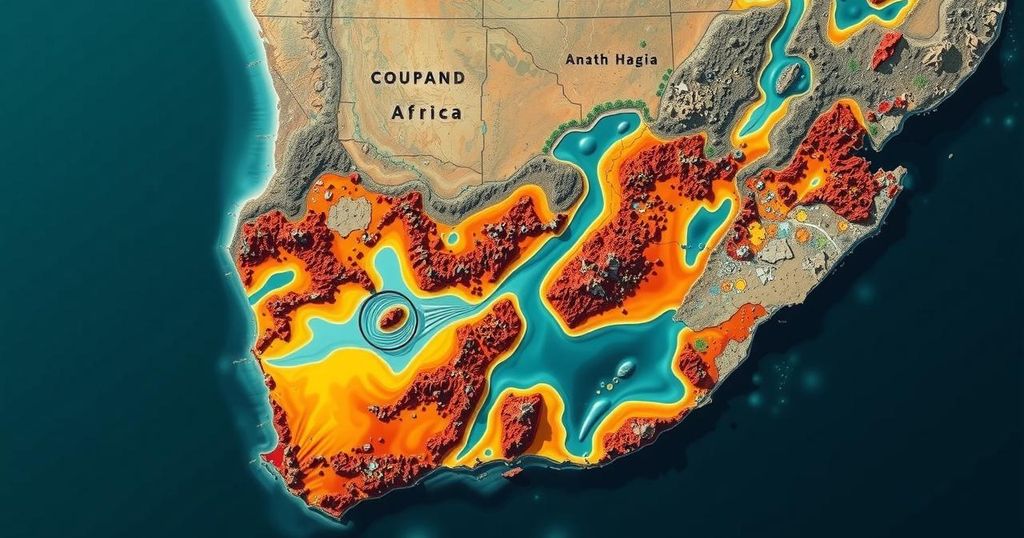In South Africa, persistent water shortages have become a pressing issue, particularly in Johannesburg, as residents face daily restrictions and outages amidst rising summer temperatures. Local protests have emerged in response to water service disruptions, drawing attention to the inefficiencies in water management and infrastructure. With climate change exacerbating the situation, there is a critical need for reforms to address these systemic issues and ensure sustainable water access for affected communities.
In South Africa, particularly in the township of Tembisa, residents are grappling with severe water shortages exacerbated by rising temperatures as summer approaches. Joyce Lakela, a local nursery owner, expressed her concern, stating, “It has been going on for five days,” as she and her neighbors resort to collecting water from municipal tankers. The City of Ekurhuleni has implemented daily water restrictions to combat what it describes as excessive consumption, coinciding with necessary maintenance work. Although the national water reserves are reported to be sufficient, the local inhabitants face the harsh reality of water cuts lasting hours or even days. Protests have erupted among citizens in areas such as Westbury and Westdene, where demonstrators took to the streets in outrage over the persistent water outages, burning tires and blocking roads. This crisis is further intensified by limitations imposed by Rand Water, the primary supplier for Gauteng, which has threatened that without immediate action to curb consumption, water shortages may worsen. The utility reported a staggering 40 percent loss of water due to leaks and unauthorized connections, emphasizing the urgent need for infrastructure improvements. Experts have pointed out that public utility mismanagement, alongside corruption, is crippling the efficacy of water systems in municipalities. Despite claims from cities like Ekurhuleni that supply issues stem from Rand Water’s inability to meet demand, the latter has defined withdrawal limits sanctioned by the Department of Water and Sanitation. There are long-term implications as well; a project aimed at expanding water supply from neighboring Lesotho has faced delays, setting back essential infrastructure updates originally meant for 2018 to a projected 2028 timeline. The situation is compounded by climate change forecasts, indicating an alarming potential reduction of up to 25 percent in South Africa’s precipitation levels by the century’s end. Without significant changes to consumption behaviors and infrastructure upgrades, authorities warn that the water crisis will not only persist but could present severe health risks as well, as fluctuating water supply systems increase the likelihood of contamination. Urgency underscores the need for comprehensive action to resolve the dire water shortage issue affecting South Africa’s largest urban center, as local communities continue to face the challenges posed by inadequate access to this critical resource.
The issue of water shortages in South Africa has reached alarming levels, particularly in densely populated urban areas like Johannesburg. With climate change further threatening the nation’s already limited water supply—averaging 450mm of annual precipitation versus the global average of 786mm—the challenges of managing water resources in the face of rising consumption demands and infrastructure deficits have become increasingly significant. This situation is aggravated by factors such as municipal mismanagement, leaks, and unauthorized water extraction, all leading to public protests and widespread hardship among residents dependent on consistent water access. Authorities have identified the need for urgent reforms to prevent the looming threat of a more complex water crisis as the population continues to grow.
In conclusion, the persistent water shortages in South Africa, particularly in Johannesburg and its surrounding areas, represent a crisis fueled by a combination of mismanagement, rising demand, infrastructure decay, and the impacts of climate change. The urgent need for decisive action is clear as communities confront the reality of dwindling water supplies amid rising temperatures and increasing public dissent. Without immediate and effective interventions, the situation threatens not only daily life for residents but also poses significant public health risks.
Original Source: www.seychellesnewsagency.com






